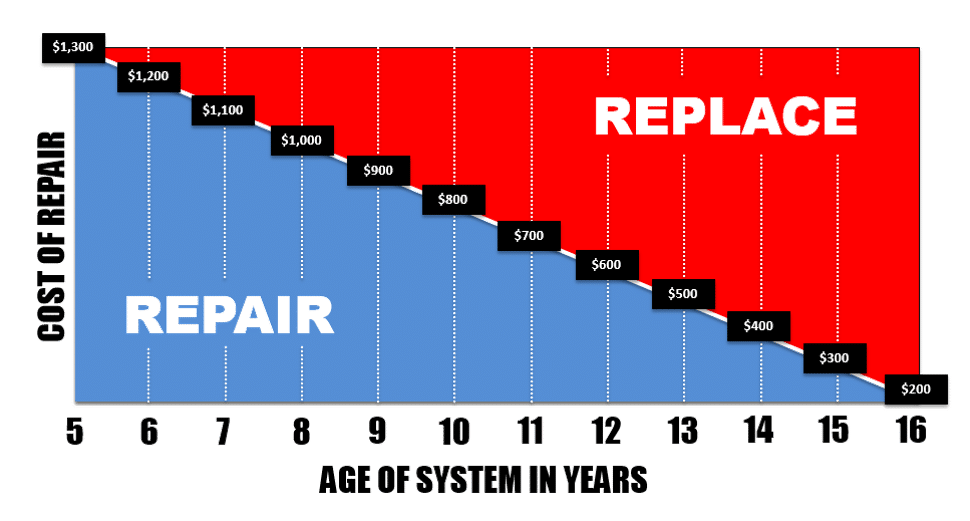Repair or Replace
Your HVAC Unit?
Factors to Consider when Deciding to Repair or Replace Your HVAC Unit?
This is often the most asked question when Superior service technicians are assessing and diagnosing a malfunctioning air conditioner or furnace. The truth is, every customer’s situation is unique. There are a variety of factors that go into deciding to purchase a new HVAC system or deciding to repair your existing HVAC unit. This is where working with a reputable HVAC company that you can trust can help guide you to making the right decision for you and your family.
Unfortunately, there are some HVAC companies that are not always completely transparent or fail to provide their customers with all the information they need to come to the right decision. Below is are some basic factors to consider when deciding to repair or replace your HVAC unit.
How Old is Your HVAC System?
The age of your HVAC unit is one of the most obvious factors to consider and should be the first question asked by an HVAC company when helping a customer assess their current air conditioner or furnace. The age of your HVAC system extends beyond just the average wear and tear over the years. Most of the older HVAC units run off of r22 refrigerant which is currently in the final stages of being phased out. This has led to drastic price hikes in basic maintenance hard costs which will only continue to make maintaining your HVAC system more expensive over time.
- Under 12 Years Old: REPAIR
- Over 12 Years Old: REPLACE

What Type of Problem is Your HVAC Unit Currently Experiencing?
Not all HVAC repairs are created equal. The extent of your system’s problem can largely impact the average consumer’s decision to replace or repair your HVAC equipment. Minor problems can cost a fraction of the out-of-pocket expenses that a major repair could cost.
- Minor Problems (Broken Ductwork, Clogged Drain Line, Electrical Issues): REPAIR
- Major Problems (Broken Blower Motor, Compressor, Condenser Coils): REPLACE
What is the Total Estimate of your HVAC Repair?
Considering the cost of a new HVAC unit vs the cost of the HVAC repair should be viewed similar to how car insurance companies deem a vehicle totaled if the estimated costs exceed the value of the car. However, unlike cars, your HVAC system can be a money-saving investment over time, and with the latest advances in energy-efficient systems, measuring the cost of your HVAC repair can be crucial in deciding whether to repair or replace it.
- Cost of repair is less than 50% of new HVAC unit (and/or is still under warranty): REPAIR
- Cost of repair is MORE than 50$ of new HVAC Unit (and is NOT covered under warranty): REPLACE
What is the Efficiency of your Current HVAC System?
There has recently been a massive upgrade in the efficiency of the average air conditioning system. Knowing your air conditioner’s current SEER level is crucial when measuring whether to repair or replace it.
- Current Unit Has a SEER Level of 13 or Over: REPAIR
- Current Unit Has a SEER Level or 12 or Under: REPLACE
How Many HVAC Repairs Have You Experienced over the Life of Your Unit?
Often as an air conditioner gets older, the frequency of air conditioning repair increases. Try and keep records of your systems maintenance history and use it to help assess whether it makes sense to repair or replace.
- Less than 2 Repairs over the Last 10 Years: REPAIR
- Over 3 Repairs on the Same HVAC Unit: REPLACE
What is the Size of your Current Air Conditioner?
It is very common for homes to have the wrong sized unit for various reasons. It is important to know what the correct sized AC Unit is for your home’s square footage. An undersized unit can be extremely under efficient while an oversized AC unit can often lead to poor humidity control and shorter lifespans.
- Correct Sized Air Conditioner: REPAIR
- Over or Under-Sized Air Conditioner: REPLACE
What is Your Current Credit Score?
Most HVAC companies offer a variety of different financing options for customers seeking to install a new air conditioning system. However, just like all financing, the better your credit history is, the better your lending terms will be.
Contact Us
Contact Us by calling our office or filling out the online form below.
"*" indicates required fields





